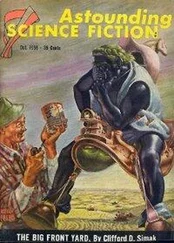He tried to sleep and couldn’t. He finally got up and dressed and went down the stairs, out the lock into the alien night.
A low voice asked, “That you, Ira?”
“It’s me, Bat Ears. I couldn’t sleep. I’m worried.”
“You’re always worried,” said Bat Ears. “It’s an occu … occu …”
“Occupational?”
“That’s it,” said Bat Ears, hiccoughing just a little. “That’s the word I wanted. Worry is an occupational disease with you.”
“We’re in a jam, Bat Ears.”
“There’s been planets,” Bat Ears said, “I wouldn’t of minded so much being marooned on, but this ain’t one of them. This here place is the tail end of creation.”
They stood together in the darkness with the sweep of alien stars above them and the silent planet stretching off to a vague horizon.
“There’s something here,” Bat Ears went on. “You can smell it in the air. Them fancy-pants in there said there wasn’t nothing here because they couldn’t see nothing and the books they’d read said nothing much could live on a planet that was just rocks and moss. But, me, I’ve seen planets. Me, I was planet-checking when most of them was in diapers and my nose can tell me more about a planet than their brains all lumped together, which, incidentally, ain’t a bad idea.”
“I think you’re right,” confessed Warren. “I can feel it myself. I couldn’t before. Maybe it’s just because we’re scared that we can feel it now.”
“I felt it before I was scared.”
“We should have looked around. That’s where we made our mistake. But there was so much work to do in the junkyard that we never thought of it.”
“Mac took a little jaunt,” said Bat Ears. “Says he found some towers.”
“He told me about them, too.”
“Mac was just a little green around the gills when he was telling me.”
“He told me he didn’t like them.”
“If there was any place to run to, Mac would be running right now.”
“In the morning,” Warren said, “we’ll go and see those towers.”
IX
They were towers, all right, and there were eight of them in line, like watchtowers that at one time had stretched across the planet, but something had happened and all the others had been leveled except the eight that were standing there.
They were built of undressed native rock, crudely piled, without mortar and with little wedges and slabs of stone used in the interstices to make the stones set solid. They were the kind of towers that might have been built by a savage race and they had an ancient look about them. They were about six feet at the base and tapered slightly toward the top and each of them was capped by a huge flat stone with an enormous boulder placed upon the slab to hold it in its place.
Warren said to Ellis, “This is your department. Take over.”
The little archaeologist didn’t answer. He walked around the nearest tower and went up close to it and examined it. He put out his hands and acted as if he meant to shake the tower, but it didn’t shake.
“Solid,” he said. “Well built and old.”
“Type F culture, I would say,” guessed Spencer.
“Maybe less than that. No attempt at an aesthetic effect – pure utility. But good craftsmanship.”
Clyne said, “Its purpose is the thing. What were the towers built for?”
“Storage space,” said Spencer.
“A marker,” Lang contradicted. “A claim marker, a cache marker …”
“We can find the purpose,” Warren said. “That is something we needn’t argue nor speculate about. All we have to do is knock off the boulder and lift the cap and have a look inside.”
He strode up to the tower and started climbing it.
It was an easy thing to climb, for there were niches in the stones and hand and toe holds were not too hard to find.
He reached the top.
“Look out below,” he yelled, and heaved at the boulder.
It rolled and then slowly settled back. He braced himself and heaved again and this time it toppled. It went plunging off the tower, smashed to the ground, went rumbling down the slope, gathering speed, hitting other boulders in its path, zigzagging with the deflection of its course, thrown high into the air by the boulders that it hit.
Warren said, “Throw a rope up to me. I’ll fasten it to the capstone and then we can haul it off.”
“We haven’t got a rope,” said Clyne.
“Someone run back to the ship and get one. I’ll wait here till he returns.”
Briggs started back toward the ship.
Warren straightened up. From the tower he had a fine view of the country and he swiveled slowly, examining it.
Somewhere nearby, he thought, the men – well, not men, but the things that built these towers – must have had their dwelling. Within a mile or so there had been at one time a habitation. For the towers would have taken time in building and that meant that the ones who built them must have had at least a semi-permanent location.
But there was nothing to see – nothing but tumbled boulder fields and great outcroppings and the blankets of primal plants that ran across their surfaces.
What did they live on? Why were they here? What would have attracted them? What would have held them here?
He halted in his pivoting, scarcely believing what he saw. Carefully he traced the form of it, making sure that the light on some boulder field was not befuddling his vision.
It couldn’t be, he told himself. It couldn’t happen three times. He must be wrong.
He sucked in his breath and held it and waited for the illusion to go away.
It didn’t go away. The thing was there.
“Spencer,” he called. “Spencer, please come up here.”
He continued watching it. Below him, he heard Spencer scrabbling up the tower. He reached down a hand and helped him.
“Look,” Warren said, pointing. “What is that out there?”
“A ship!” cried Spencer. “There’s another ship out there!”
X
The spaceship was old, incredibly old. It was red with rust; you could put your hand against its metal hide and sweep your hand across it and the flakes of rust would rain down upon the rock and your hand would come away painted with rust.
The airlock once had been closed, but someone or something had battered a hole straight through it without opening it, for the rim was still in place against the hull and the jagged hole ran to the ship’s interior. For yards around the lock, the ground was red with violently scattered rust.
They clambered through the hole. Inside, the ship was bright and shining, without a trace of rust, although there was a coating of dust over everything. Through the dust upon the floor was a beaten track and many isolated footprints where the owners of the prints had stepped out of the path. They were alien tracks, with a heavy heel and three great toes, for all the world like the tracks of a mighty bird or some long-dead dinosaur.
The trail led through the ship back to the engine room and there the empty platform stood, with the engines gone.
“That’s how they got away,” said Warren, “the ones who junked their engines. They took the engines off this ship and put them in their ship and then they took off.”
“But they wouldn’t know –” argued Clyne.
“They evidently did,” Warren interrupted bluntly.
Spencer said, “They must have been the ones. This ship has been here for a long time – the rust will tell you that. And it was closed, hermetically sealed, because there’s no rust inside. That hole was punched through the lock fairly recently and the engines taken.”
“That means, then,” said Lang, “that they did junk their engines. They ripped them out entire and heaved them in the junkpile. They tore them out and replaced them with the engines from this ship.”
Читать дальше












